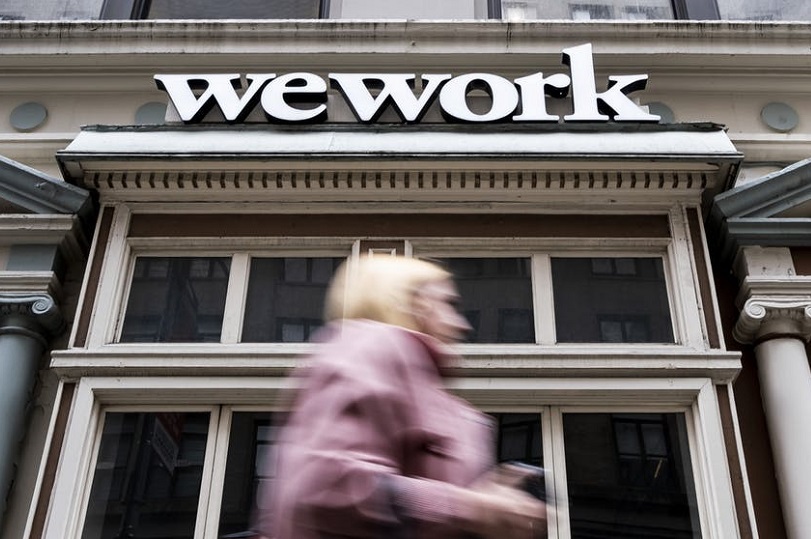Fallout from WeWork’s failed IPO shows the folly of excessive valuations

WeWork has undergone a dramatic fall from grace in the last few weeks. Just two months ago the office rental start up was expecting to offer shares to the public at a total business valuation of US$47 billion. This soon halved and then investors rapidly pulled their support for an initial public offering (IPO) above US$12 billion. The IPO was withdrawn with catastrophic consequences for the business and its charismatic founder Adam Neumann.
The fallout for tech IPO markets, and investment in start ups more generally may also be severe. WeWork follows a number of so-called unicorn valuations of more than US$1 billion that have gone public and subsequently nosedived in value. Its uncertain future reflects how investors have wised up to the hype around Silicon Valley start ups.
Certainly, WeWork had problems that were specific to the company. Its chief executive Adam Neumann was a worry to investors – he has since been deposed and is now a non-executive chairman. He is being followed to the exit by 20 of his senior supporters and family. The company jet is up for sale, nearly all future development is being curtailed, at least a third of the workforce of 15,000 are likely to lose their jobs and a number of recent acquisitions are being sold off.
WeWork’s financial situation was also a worry to investors. Its debt has been categorised by banks as “distressed” and concern is rising among landlords as to its viability. The company’s future liabilities to landlords total US$47 billion. There are even fears of a property recession as a consequence of curtailed demand.
WeWork has less than one year’s worth of cash left and without the IPO it will be very difficult to raise new money. It is losing almost US$2 billion a year and now needs to stop the losses. Some reports even suggest that WeWork may not be viable beyond November without an immediate rescue package. Investment bankers are desperately working on an attempt to rescue some value from this catastrophe.
Excessive valuations
The WeWork IPO saga follows hot on the heels of IPOs from taxi hailing apps Uber and Lyft earlier in 2019, as well as the messenger app Slack and the much-hyped home exercise business Peloton. All are now trading well below their offer prices.
Founders, early investors and investment banks have hugely overpriced a number of IPOs in the last few years, which means new investors could not profit from them. Appetite for technology IPOs is waning fast, as a result. An immediate consequence is the withdrawal of some planned IPOs and deferral of others such as AirBnb.
What is becoming clear is that investment banks cannot value loss making technology start ups for an IPO. Uber was originally claimed to be worth US$120 billion, its IPO was valued at US$83 billion, and its current valuation is around US$55 billion. Many believe even that is excessive. Similarly, WeWork was originally claimed to be worth US$70 billion, then US$47 billion but failed to reach even US$15 billion before withdrawal.

The same story for other IPOs has destroyed the credibility of investment bank valuations in loss making companies at their early stage of life. It may be that greed is driving these valuations, but the outcome is closing the IPO market so early investors cannot capitalise by exiting.
Softbank’s hard landing
Ultimately, venture capital investors like Japanese tech investment firm Softbank, must take some blame for inflating the IPO market. It is one of WeWork’s biggest backers, with US$10.4 billion invested, and has major stakes in both Uber and Slack. These are all companies with high growth rates but which remain a long way from profitability.
This focus on growth without regard for future profits has been a feature of the recent boom in tech start-up investments. Everyone is hoping to get in early on the next Amazon or Facebook. But, given that so much of the vast venture capital injections of cash into start ups has been wasted or extracted by founders as a result of poor supervision, investors must be more wary of who they are getting involved with. If there is a struggle to find a buyer or values fall dramatically, they must change the strategy of the businesses they invest in to produce profits more rapidly, which in turn will reduce growth rates.
Venture capital investors have none but themselves to blame for severely handicapping their own business model through excessive valuations. With the hype for tech start ups starting to recede, their choices are limited. Either invest further in a business with limited prospects or allow it to fail. This would be reminiscent of the dot.com era which sent significant numbers of start ups to the wall.
Author: John Colley, Professor of Practice, Associate Dean, Warwick Business School, University of Warwick
This article is republished from The Conversation under a Creative Commons license. Read the original article.
Comment Manually
You must be logged in to post a comment.

No comments